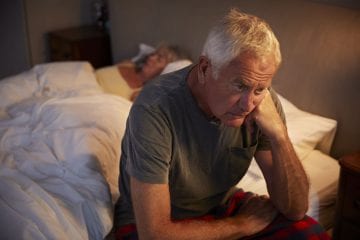We know that there’s a relationship between obesity and sleep deprivation, but is it the extra weight that causes sleep problems or does poor sleep make you fat? Well, both. It’s a complex relationship, and one that we’ll explore today.
For people with a high BMI there’s a correlation with sleeping later than normal (both going to bed and waking up late) and a shorter sleeping time overall. Although there are discrepancies in the norm (some people lose weight when they don’t sleep enough), the majority of the population will have a direct correlation between less sleep and added fat.
We’ve discovered in many studies that long periods of shortened sleep will also lead to cardiovascular disease and insulin resistance. Why? When we lack sleep, we crave foods high in calories and carbohydrates. This pattern has been proven; thanks to advanced medical imaging scans we see that the area of the brain linked to appetite is more active in people who sleep less.
The deeper picture is more complex. In some studies the subjects still gained weight despite no notable difference in appetite. Could it be the foods we choose to eat? While one night of poor sleep may leave you wanting to eat more, a second night may change what you eat. For example, you may look for quick resolutions to your hunger through cake and chocolate as opposed to healthier options of fruit and vegetables.
At the moment we’re in the middle of an obesity crisis and there’re two sides to the problem:
- consuming too many calories
- not burning enough calories through exercise.
Unfortunately both of these factors are affected when we lack sleep. When tired, we’re less inclined to exercise (and we also fidget less). And we can’t ignore the hormones.
Table of Contents
The role of hormones
Leptin and Ghrelin
Our bodies are incredibly clever; the fat cells (adipocytes) release leptin. Once it hits the bloodstream, it informs the mind that there’re sufficient fat stores and suppresses the appetite. On the flip side, the stomach will release ghrelin when empty, and then we eat. We’ve simplified this a little and scientists will tell you that those who are obese will tend to have higher levels of ghrelin.
Regardless, the problem with sleep deprivation is that it pushes up the ghrelin levels and suppresses the leptin. Suddenly the brain thinks that the body is starving and we need to eat. According to some experts four hours is the magic switching point. If we get less than four hours of sleep a night, the blood plasma will have higher levels of ghrelin and lower levels of leptin.
Just like the sleep circadian cycle, leptin follows the circadian rhythm. But instead of being tied to day and night it’s more correlated with habitual meal patterns. The amount of exercise you perform will also decrease leptin levels.
Other hormones
Our sleep patterns are affected by the corticotrophin-releasing hormone and growth hormone-releasing hormone (GHRH) and how these two interact. Sleep is promoted by two hormones: Neuropeptide Y and Galanin.
We’ve recently learned about the hypocretin (orexin) system in the hypothalamus. As we know, the release of leptin regulates appetite and informs the brain about energy levels in the body. The release of leptin is affected by the levels of orexin. Though scientists have tried to stay on top of these interactions and how/why they occur, they’ve been unable to understand all of them so far.
There are several cycles and systems in the body that seem to compete. We hope that deeper understanding of hormones in future will allow treatments to be discovered for sleeping problems. Since sleep and weight have a direct relationship, this could also lead to improvements in the obesity crisis that so many specialists are concerned about in the Western world.
There is cause for hope and scientists have been working closer with orexin. After noticing how it interacts with leptin there has been excitement that this correlation could become a therapeutic opportunity in the future. By increasing orexin levels we could assist leptin release and help people who are obese.
Evolutionary causes
People who suffer from sleep deprivation are well aware that this condition leads to drowsiness and fatigue the next day (low energy levels), which leads to less exercise. As we’ve seen, it also causes higher appetite and we find ourselves craving fatty foods. So it’s almost a double effect - we exercise less and eat more.
Biological evolution leads us to store more fat in the summer in preparation for the colder months ahead. With short nights and long days we sleep less, and these circadian signals might lead to the body storing more fat.
Thankfully the hard work of scientists has allowed us an answer to most questions. For example, we know that the circadian clock controls certain genes that regulate the sleep-wake clock; these same genes impact fat deposits too.
Using genetic engineering, researchers managed to switch off this clock gene in mice and they didn’t gain weight even when put on a highly calorific diet compared to the control group. With a disruption in the glucose and lipid metabolic pathways the mice in the first (genetically modified) group didn’t store anywhere near as much fat as the second (control) group.
Released by adipose tissue and called adipokines, visfatin and leptin are hormones that are higher in people with a risk of diabetes (i.e. with high resistance to insulin). A study showed that sleep deprivation increased the blood levels of the hormones. While leptin increased by 6%, the jump was higher for visfatin at 14% (PER HOUR of lost sleep).
Note: Retinol-binding protein 4 is another adipokine thought to influence insulin resistance, and there was no change here with sleep deprivation.
With all of this information the link between craving foods high in fat and a disrupted circadian rhythm grows stronger (this has even been quoted in reports that scientists have found in the Nature magazine).
What about when stress levels are high? The body may just react differently during these times; when stress is to blame for loss of sleep, the increase in calorie consumption is thought to be higher. We now commonly refer to this craving as ‘comfort eating’.
The impact on child obesity
After the results of a British study were published, a link between time spent in the stage 3 and REM sleep and weight was established. Kids who were moderately overweight spent more time in REM sleep and deep sleep. Yet kids under the ‘obese’ classification had their REM sleep and deep sleep cut short.
Research has also brought up connections between loss of sleep and insulin sensitivity in children.
Eating and sleeping correctly
If we needed further proof of the relationship between diet and sleep, we would only need to look at eating habits that don’t conform to the ‘norm’. Were you ever so naughty as a child that you were forced to bed without dinner? If so, you’ll know how tricky it is to sleep with an empty stomach.
The eating and drinking times of Muslims during Ramadan are confined to specific periods of the day. As a result, sleep latency increases while slow-wave sleep and REM sleep decrease. When body temperature fluctuations shift, this also indicates a shift in the circadian cycle. In another study the total sleep time and nonREM sleep stayed the same while REM sleep time reduced.
Again, this has been shown with mice. Their circadian cycle was directly affected after adjusting their diet and time of eating. However, the researchers couldn’t determine the importance of the fat percentage in the diet, whether the mice were eating when they would normally sleep, or the molecular mechanism for this change.
Short-term vs. long-term trend
Of course, it’s impossible to prove cause and effect just because many sleep deprived people are obese (and vice versa). There was much debate among doctors about whether they should be intervening to get people to sleep more. Either way, the evidence that sleep duration is directly affected by metabolic hormone levels is only getting stronger.
While some scientists are hesitant, others look towards long-term trends to support the cause and effect idea. For example, the average sleep duration has decreased over the past 100 years or so. Over the last 40 years obesity has grown and the average BMI has followed suit.
Can we make the jump from individuals to a whole society? To provide an insight to the other side, some will say that the decrease in sleep times is insignificant. Moreover, obesity can be a result of many other problems; for one thing, the increase in machinery and automation in the workplace has led to a fall in demand for human muscle. For another, the fact that junk food is so cheap and widely available.
Moving forward
Whether clear evidence or sheer coincidence, many are still calling for people to correct their sleeping patterns to sleep more. Researchers are pushing for more studies to learn more.
Despite this many people are still skeptical, and this includes Jim Horne, a revered sleep scientist. He says that the link between weight gain and lack of sleep is too weak and that accidents related to sleepiness are a more prominent concern for this new trend of sleep deprivation. Although he agrees that getting less than four hours a night would affect glucose intolerance, he also states that the ‘short sleeper’ quality would only be found in a low percentage of the obese people.



